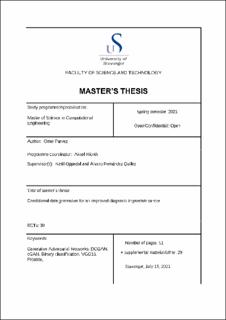| dc.description.abstract | Prostate Cancer is the second most common cancer in men worldwide, the fourth most commonly occurring cancer overall and the sixth leading cause of cancer death among men worldwide. Early detection of prostate cancer is crucial for survival. MRI examination is an essential and a comfortable tool towards a precise diagnosis at an early stage. But this diagnosis is dependent on the experience and expertise of the reader. Deep learning methods can be used for the classification of tumors, as various DL methods have proven to be helpful for the classification and detection tasks.
To work towards this goal, this thesis will explore how generative adversarial networks can be used to improve prostate MRI classification. Different deep learning architecture have been proven accurate in the classification of the biomedical images. However, large volume of training data is required, which is difficult to obtain due to the patient privacy policy. To this end, this thesis proposes a two step approach to improve the classification, the first step is to generate anonymized training data using using two GAN architectures and the second step is to use the anonymized training data to train classification network. This thesis proposes two GAN architectures, DCGAN and cGAN to generate training data to improve the image classification. The synthetic data is used together with original data for the training of VGG16 classification network and compare the performance of the classification network with generated data and without it.
The final results indicate significantly better image classification using cGAN when compared with the original data and classic augmentation methods. The network performs better for the generated data when compared with the original and augmented data. | |
